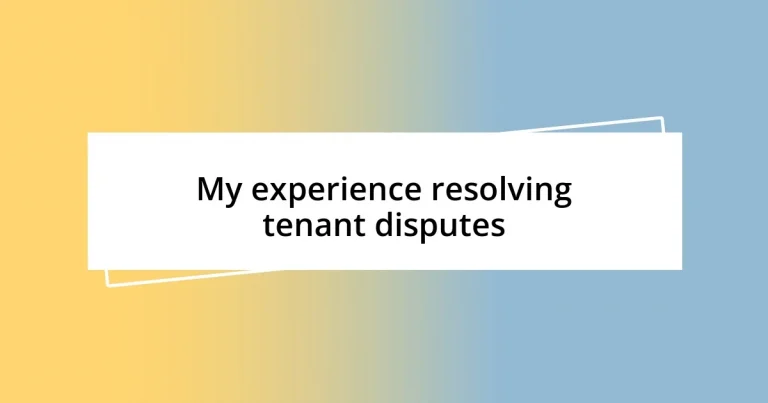Key takeaways:
- Effective communication, including active listening and clarity, is essential for resolving tenant disputes and fostering trust.
- Understanding the root causes of disputes, such as maintenance issues and misunderstandings of lease terms, can prevent escalation and promote better landlord-tenant relationships.
- Utilizing mediation services can lead to constructive solutions and improved communication, setting a foundation for ongoing collaboration and understanding between landlords and tenants.
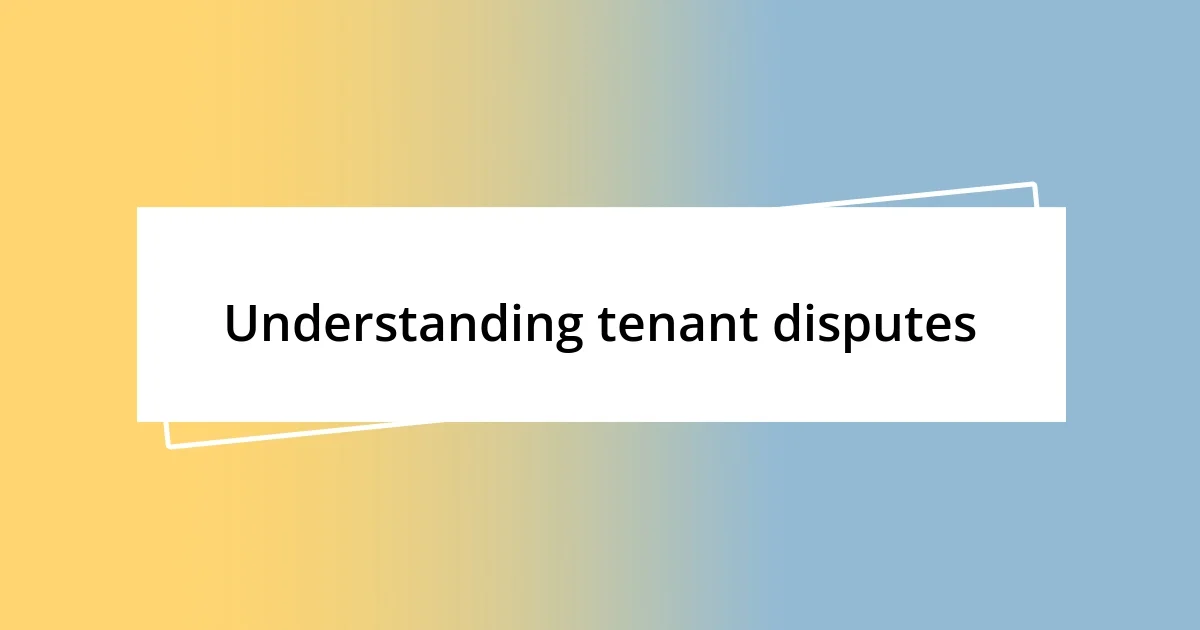
Understanding tenant disputes
Tenant disputes often arise from misunderstandings or unmet expectations. I remember once dealing with a situation where my tenant believed the heating system was inadequate, while I thought it was functioning perfectly. This disconnect led to frustration on both sides—doesn’t it make you wonder how a simple miscommunication can spiral into something much bigger?
Another aspect I’ve observed is that tenant disputes can be deeply emotional. I had a tenant who was truly distressed when I needed to discuss a rent increase—his family was facing financial challenges. It became clear to me that these disputes are not just about the contract; they often touch on personal issues that affect people’s lives. Have you ever found yourself torn between your professional responsibilities and your empathy for a tenant’s situation?
Understanding the root causes of tenant disputes, such as maintenance issues, late payments, or differing expectations about the lease terms, is crucial. I’ve learned that each dispute has its own story, and often it helps to look beyond the surface. Engaging in open dialogue made a world of difference for me—don’t you think effective communication is key to resolving issues before they escalate?
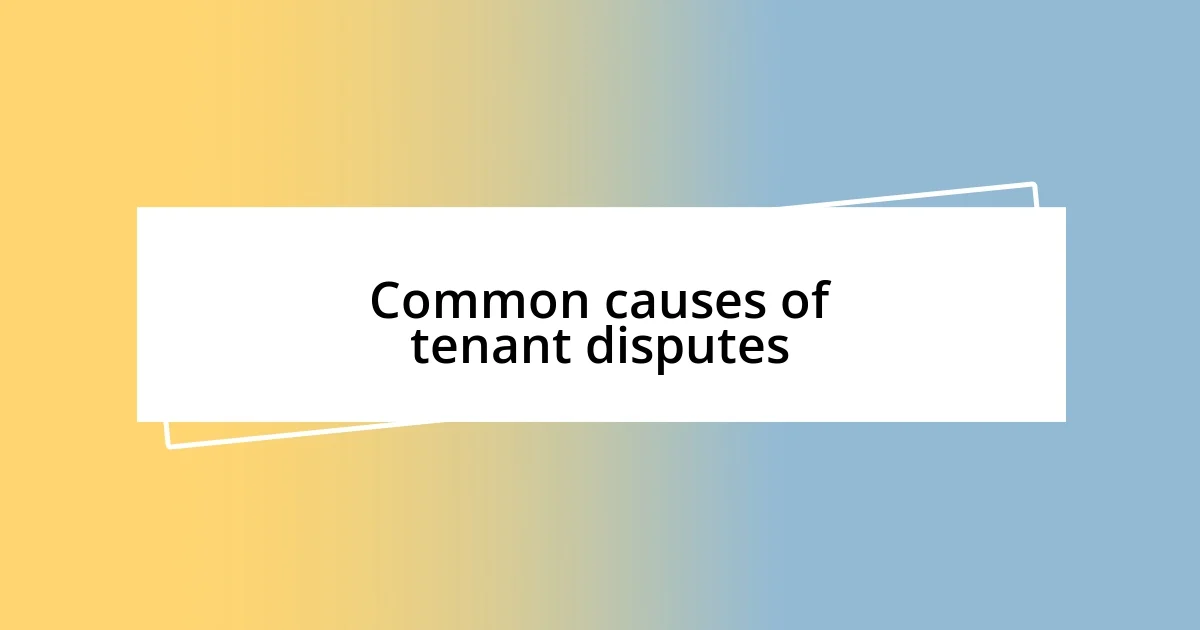
Common causes of tenant disputes
One of the most frequent triggers for tenant disputes I’ve encountered is maintenance issues. I recall a time when a tenant reported persistent plumbing problems. Every week, they’d remind me, and I’d promise I’d take a look. Unfortunately, my delays led to more than just frustration; it was a growing tension that could’ve been avoided with quicker responses.
Here are some common causes of tenant disputes:
- Maintenance Delays: Tenants may feel neglected if repairs aren’t addressed promptly, leading to feelings of frustration.
- Late Rent Payments: Dependable cash flow can become a source of stress, especially when unexpected circumstances arise; I once had a tenant submit payments inconsistently due to job instability, which made discussions about rent awkward.
- Lease Agreement Misunderstandings: Many disputes stem from different interpretations of lease terms—for instance, a tenant might think they can modify the property, while the lease clearly prohibits that.
- Noise Complaints: This can escalate quickly; I’ve had a neighbor dispute where daily late-night gatherings disturbed everyone, resulting in complaints I wish had been resolved earlier.
These scenarios often highlight that behind every dispute, there are real emotions and circumstances at play. It’s essential to recognize that the relationship between landlords and tenants is built on trust and clear communication.
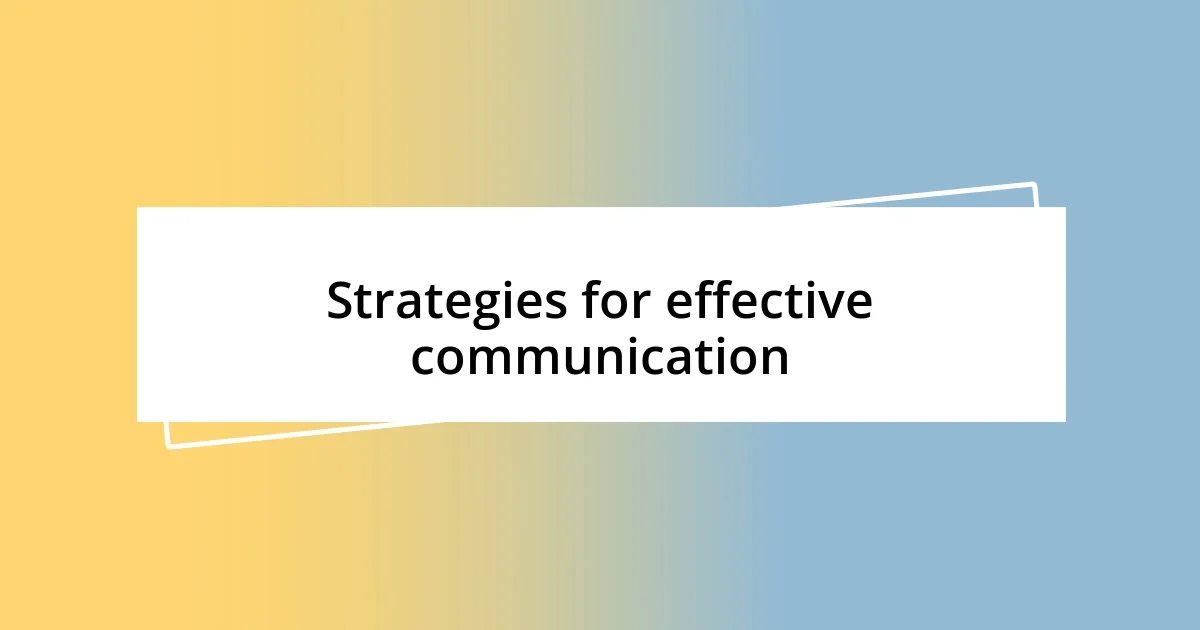
Strategies for effective communication
Effective communication is a game-changer when it comes to resolving tenant disputes. I’ve discovered that actively listening to tenants can completely transform a heated conversation into a constructive dialogue. Once, during a dispute about a noisy neighbor, simply allowing my tenant to express their frustrations without interruption brought clarity to their experience and helped me identify the root issue. Don’t you think sometimes just being heard can make a significant difference?
I also emphasize the importance of clarity in communication. In my experience, vague messages can lead to misunderstandings. For instance, when discussing rental agreements, I learned that being precise about terms can prevent future disagreements. Last summer, I took extra time to go over each clause with new tenants, which not only set the right expectations but also built a foundation of trust that helped avoid disputes later on.
Moreover, employing a friendly yet professional tone can enhance relationships significantly. I recall when I needed to have a tough talk about late rent payments; framing my concern with empathy allowed my tenant to feel understood rather than cornered. We were in it together, and that made the process smoother. Have you noticed how much easier conversations become when you take a compassionate approach?
| Communication Strategy | Impact |
|---|---|
| Active Listening | Fosters trust and understanding by validating tenant feelings. |
| Clarity in Messaging | Prevents misunderstandings and sets clear expectations. |
| Empathy | Makes difficult conversations more manageable and fosters cooperation. |
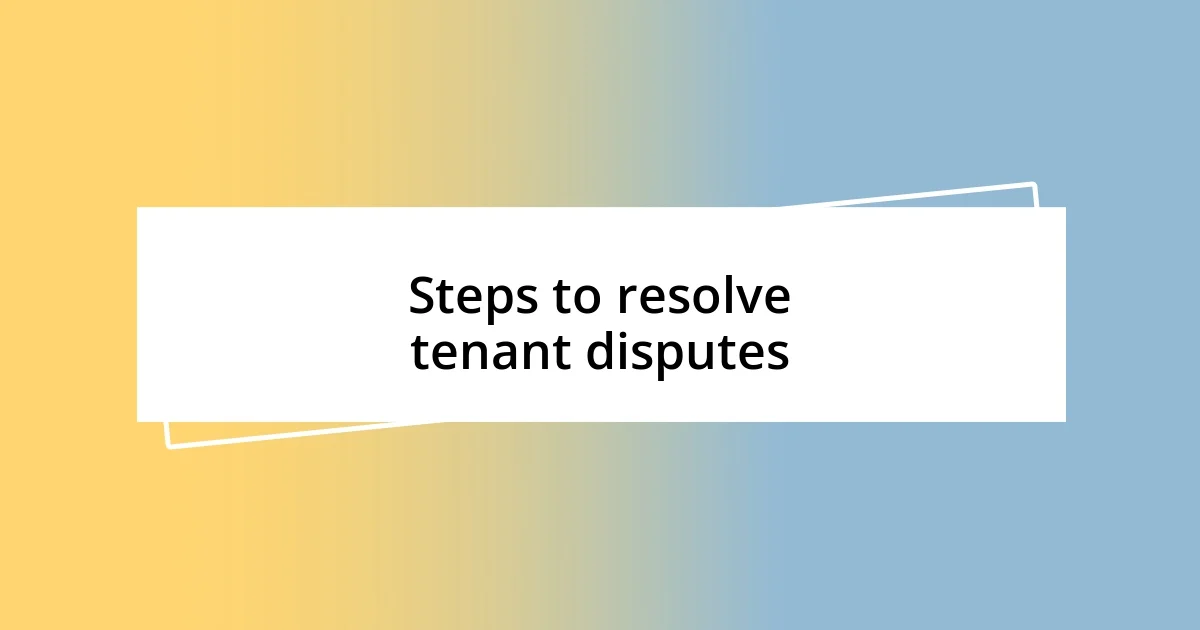
Steps to resolve tenant disputes
When responding to a tenant dispute, I always start by gathering all relevant details. It’s surprising how often folks overlook the specifics. I remember a time when a long-standing disagreement about maintenance arose. I took the time to review past communication and documented complaints, which helped clarify the timeline for both me and the tenant. Having facts at hand transformed our conversation from a blame game into a collaborative problem-solving session. Have you ever found that being prepared changes the dynamic?
Next, I’ve learned the value of mediation as a tool for resolution. Bringing in a neutral third party can ease tensions and provide a fresh perspective. I once organized a joint meeting with a tenant and an impartial friend to discuss a particularly contentious issue about noise. That simple class of mediation turned a potentially explosive situation into a productive dialogue, where we could all share concerns without hostility. Don’t you think a little help from outside can avoid a lot of misunderstandings?
Finally, it’s crucial to document everything after the dispute is resolved. I’ve often found that taking notes about our discussions and the agreed-upon outcomes reaffirmed understanding. Once, after finalizing a repair agreement, I followed up with a summary email. This step not only validated the resolution but also built trust for future interactions. How often do you think people forget that a simple follow-up can keep the lines of communication open?
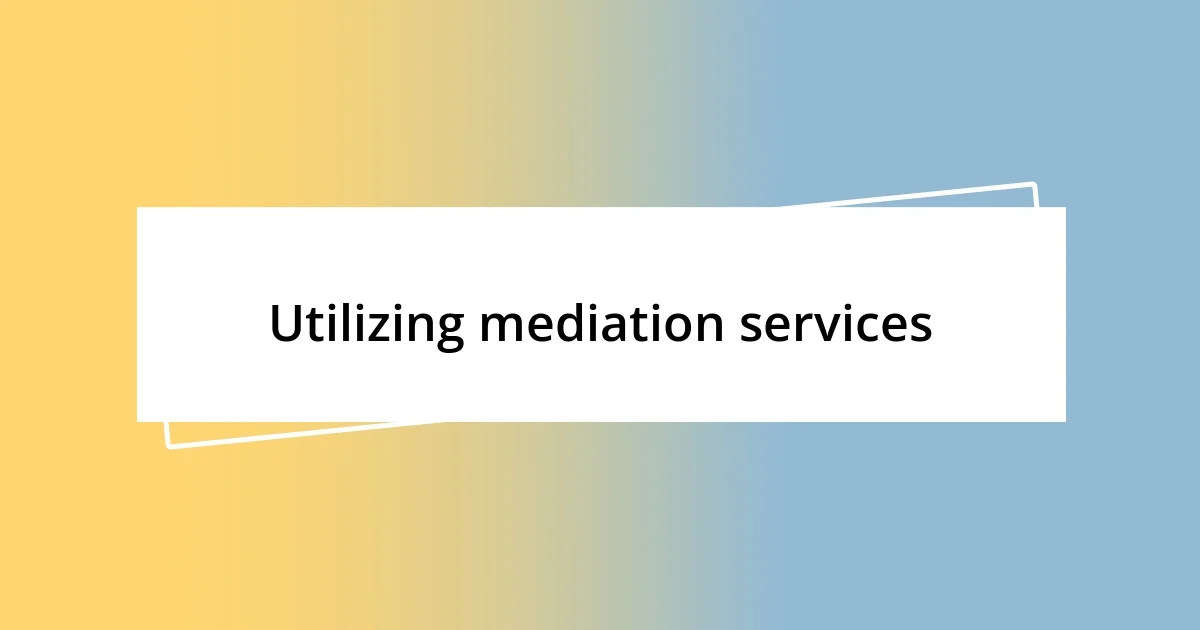
Utilizing mediation services
Mediation services can be a lifeline in tenant disputes. I remember a time when tensions escalated between roommates over shared responsibilities. Seeking mediation not only provided a neutral ground but led to unexpected solutions. The mediator facilitated a discussion that prompted both parties to express their needs and compromises, resulting in a roommate agreement that everyone could support. Isn’t it fascinating how a structured environment can foster cooperation?
Engaging a mediation service also provides access to expertise that may not be available within the tenant-landlord relationship. During another dispute involving a lease violation, I decided to involve a professional mediator. Their guidance helped clarify legal points that were ambiguous to both parties. It’s remarkable how they could distill complex information into digestible bits, paving the way for a resolution. Have you ever found guidance from an expert made a situation clearer?
Ultimately, utilizing mediation services can lead to stronger relationships in the long run. After resolving that lease violation, I was amazed at how open communication became between us. We could discuss future issues transparently, which built trust. It struck me that sometimes, the presence of a mediator is less about solving a single problem and more about setting the stage for future collaboration. Don’t you think fostering an ongoing dialogue is invaluable?
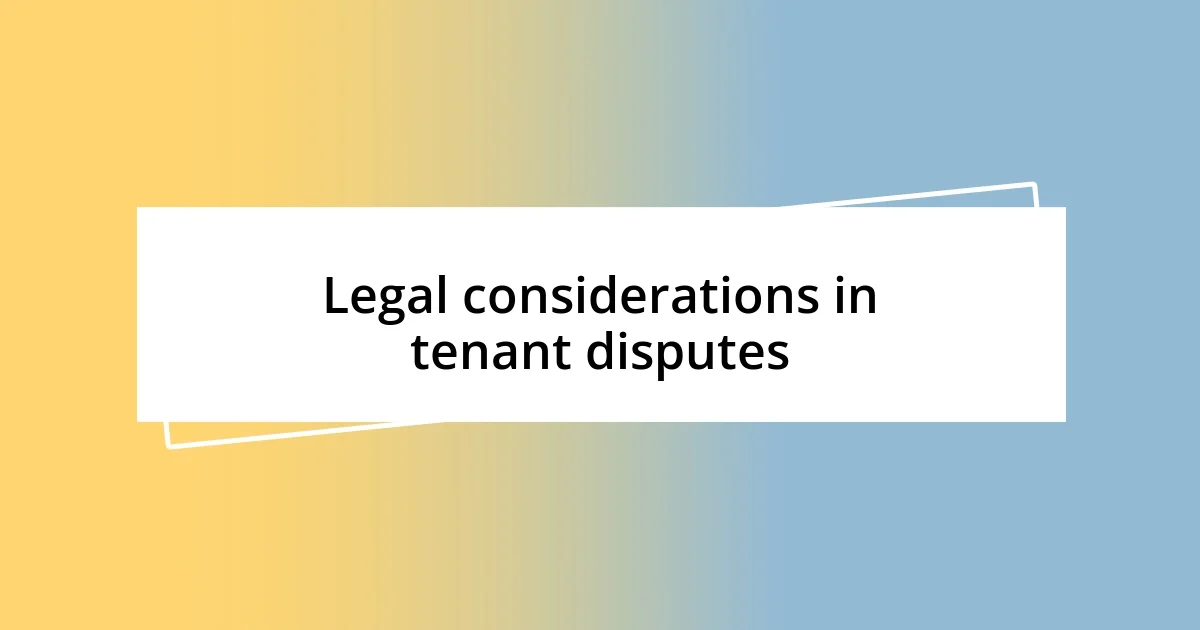
Legal considerations in tenant disputes
When navigating tenant disputes, it’s essential to understand the legal framework surrounding them. I recall a situation where I almost made a costly mistake by acting on assumptions regarding lease agreements. Familiarizing myself with local tenant laws not only prevented that error but also equipped me to articulate my position with confidence. Have you ever realized that knowing the law can be your best ally in challenging situations?
Another consideration is the significance of notice periods and eviction processes. There was a time when I needed to address a tenant’s late rent payment. Carefully reviewing local regulations helped me craft a timely notice without crossing legal boundaries. It’s fascinating how a simple understanding of notice requirements can protect your interests while also giving the tenant a fair opportunity to correct the situation. Wouldn’t you agree that clarity on these processes creates a more transparent landlord-tenant relationship?
Finally, I can’t emphasize enough the importance of written communication in legal matters. Once, during a dispute regarding property maintenance obligations, I decided to document every conversation. This not only served as a record for any potential legal discussions but also created a shared understanding of what had been agreed upon. How reassuring it is to have written proof in a world full of misunderstandings, right?
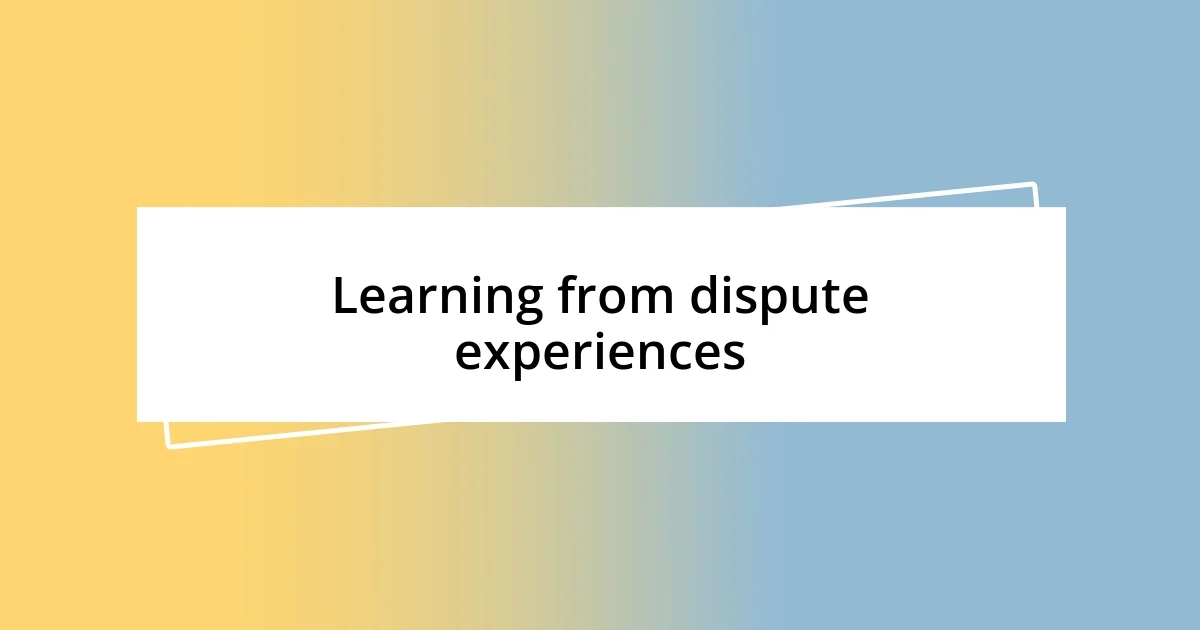
Learning from dispute experiences
Learning from disputes can be one of the most transformative experiences. I had a situation where, after a heated argument, I took a step back and analyzed what went wrong. I realized how my tone and body language may have escalated the tension, rather than diffusing it. Have you ever found that your approach can shift the entire dynamic of a conversation?
In another instance, I learned the importance of active listening in resolving conflicts. During a particularly tough disagreement, I made a point to really hear my tenant’s concerns instead of formulating my response in my head. This strategy not only surprised me by uncovering underlying issues but also created a sense of empathy that bridged the gap between us. Doesn’t it strike you how often we listen to respond instead of genuinely understanding?
That experience reinforced my belief that every dispute carries valuable lessons. I found that reflecting on what I could have done differently often led to major improvements in future interactions. Like that time I promptly addressed a minor issue before it escalated; it taught me the power of proactive communication and how it can alleviate future grievances. Don’t you think every conflict is an opportunity to learn and strengthen our relationships?












